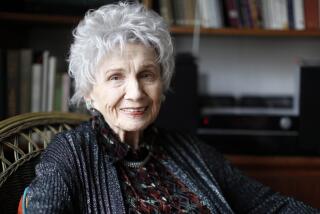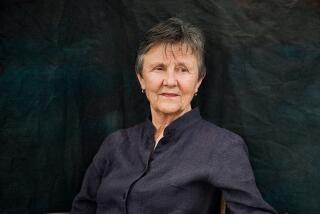Janet Frame, 79; Writer of Prize-Winning Novels
- Share via
Janet Frame, who was widely considered New Zealand’s finest writer, has died. She was 79.
The author of novels, short stories, essays and poetry, Frame died Thursday in Dunedin, New Zealand. She suffered from acute leukemia, officials at Dunedin Hospital told the Associated Press.
Of her 11 novels, “Faces in the Water” (1961), which recounts a woman’s years in a New Zealand asylum, was her best work, novelist Joyce Carol Oates said in a review for the New York Times. Oates wrote that the book “dealt with the fluid boundary between sanity and madness, the watery depths of madness in which the normal see their own faces.”
Frame’s tormented personal story was reflected in much of her fiction, which centered on the inadequacy of language to convey emotions. Several of her major characters were either mute, tongue-tied or treated like outcasts by the conforming world.
She spent most of her adult years in a hermit-like existence and distressed emotional state, writing constantly. She once said writing was the only thing that mattered to her. Her books were widely praised, she was awarded numerous literary prizes and was reportedly twice considered for the Nobel Prize for literature.
Several of her works were made into movies, including her three-volume autobiography, which was adapted as a film, “An Angel at My Table,” directed by Jane Campion in 1990.
Born in Dunedin, one of four children of a railroad worker, Frame moved with her family to Oamaru, where she was raised, as a Washington Post reviewer once noted, “physically, emotionally and culturally deprived” by her parents and the difficult environment in which they lived.
As a young girl Frame planned to be a poet, but she also completed training at Dunedin Teachers’ College. When a superior came to evaluate her performance in the classroom, she fled for fear of judgment and never returned to teaching. The incident convinced her that she was a failure, and she attempted suicide.
She enrolled at the University of Otaga in New Zealand and wrote about her attempted suicide for a psychology class assignment. Within days, college authorities had her hospitalized. She was misdiagnosed with schizophrenia.
Through eight years spent in asylums and more than 100 electroshock treatments, Frame wrote stories about madness and alienation. One collection, “The Lagoon,” was published while she was confined and won a literary prize in 1951. Doctors had scheduled Frame for a frontal lobotomy, but one of them learned of her literary prize and had her released from the hospital.
“It is no wonder that I value writing as a way of life when it actually saved my life,” Frame wrote some years later.
A well-known New Zealand writer, Frank Sargeson, befriended Frame, gave her a place to live on his property in Auckland and arranged for a stipend to support her. The first novel she completed under his care, “Owls Do Cry,” is pointedly autobiographical.
She was awarded a government grant in 1956 and used it to live in Spain and England until 1963. In those years, she published three novels and two collections of short stories. She also was evaluated by doctors at the Maudsley Hospital Institute of Psychiatry in London, who concluded that she was not schizophrenic. She returned to New Zealand in 1963.
She tried to erase the stigma of mental illness, claiming that she only pretended to be mad as a way of coping with shyness and estrangement as a young woman. “I had never been schizophrenic ... I never should have been admitted to a mental hospital,” she wrote in “The Envoy From Mirror City” (1984), the third volume of her life story. “Any problems I now experienced were mostly a direct result of my stay in the hospital.”
Frame is survived by a sister.
More to Read
Sign up for our Book Club newsletter
Get the latest news, events and more from the Los Angeles Times Book Club, and help us get L.A. reading and talking.
You may occasionally receive promotional content from the Los Angeles Times.










